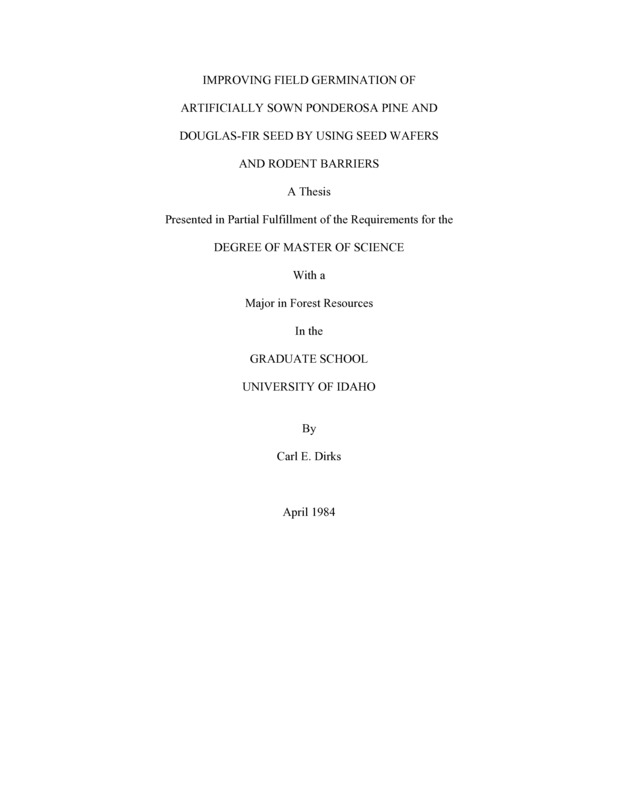PDF PREVIEW
Improving Field Germination of Artificially Sewn Ponderosa Pine and Douglas-fir Seed by Using Seed Wafers and Rodent Barriers Item Info
Download Preview PDF
Please note: PDF file may not be complete document.
- Title:
- Improving Field Germination of Artificially Sewn Ponderosa Pine and Douglas-fir Seed by Using Seed Wafers and Rodent Barriers
- Creator:
- Dirks, Carl E.
- Date Created:
- 1984-04
- Description:
- Encapsulating conifer seed in vermiculite seed wafers for improved forest regeneration has been pursued by forestry researchers since 1974. This method of forest regeneration is a potential alternative to broadcast seeding and tree planting methods. This project was conducted to determine the effects of encapsulation on germination of ponderosa pine (Pinus ponderosa Laws) and Douglas-fir ( Pseudotsuga menziesii Biessn.) Franco) seed, and first year survival of the seedlings. Additionally , two rodent barriers, plastic sheltercones and Vexar mesh cones, were tested for their effects on seed germination, seedling survival, and seedling height growth. Encapsulating the seed caused significantly improved germination of seed for both species in the first field study, and for ponderosa pine in the second field study. Significant improvements in germination were obtained when barriers were used, thus indicating some seed protection from rodents and birds. However, seedlings inside sheltercones had a significantly higher rate of mortality than those under the Vexar cones or with no protection treatments. The cause was determined to be partially due to increased temperatures inside the sheltercones. Temperature inside the sheltercones approached lethal levels during the hottest part of the summer day. Neither encapsulation nor physical barriers significantly effected seedlings height growth for 3-month and 15- month seedlings.
- Document Type:
- Thesis
- Library Call Number:
- SD397.P6115D57
- Subjects:
- Flat Creek encapsulation rodent barriers seed wafers germination survival rates silviculture
- UIEF Unit:
- Flat Creek
- Location:
- UIEF; Flat Creek
- Latitude:
- 46.850522
- Longitude:
- -116.736638
- Department:
- Department of Forest Resources
- Type:
- Text
- Format:
- application/pdf
Source
- Preferred Citation:
- "Improving Field Germination of Artificially Sewn Ponderosa Pine and Douglas-fir Seed by Using Seed Wafers and Rodent Barriers", UIEF Research Exchange, University of Idaho Library Digital Collections, https://www.lib.uidaho.edu/digital/uief/items/uief_0034.html
Rights
- Rights:
- In copyright, educational use permitted.
- Standardized Rights:
- http://rightsstatements.org/vocab/InC-EDU/1.0/

